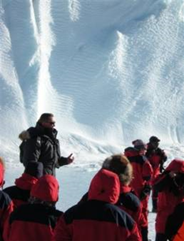 AP – Antarctic glaciers are melting faster across a much wider area than previously thought, scientists said Wednesday — a development that could lead to an unprecedented rise in sea levels. A report by thousands of scientists for the 2007-2008 International Polar Year concluded that the western part of the continent is warming up, not just the Antarctic Peninsula. Previously most of the warming was thought to occur on the narrow stretch pointing toward South America, said Colin Summerhayes, executive director of the Britain-based Scientific Committee on Antarctic Research and a member of International Polar Year’s steering committee. But satellite data and automated weather stations indicate otherwise. "The warming we see in the peninsula also extends all the way down to what is called west Antarctica," Summerhayes told The Associated Press. "That’s unusual and unexpected." … The biggest west Antarctic glacier, the Pine Island Glacier, is moving 40 percent faster than it was in the 1970s, discharging water and ice more rapidly into the ocean, Summerhayes said. The Smith Glacier, also in west Antarctica, is moving 83 percent faster than it did in 1992, he said. All the glaciers in the area together are losing a total of around 103 billion tons (114 billion U.S. tons) per year because the discharge is much greater than the new snowfall, he said. "That’s equivalent to the current mass loss from the whole of the Greenland ice sheet," Summerhayes said, adding that the glaciers’ discharge was making a significant contribution to the rise in sea levels. "We didn’t realize it was moving that fast." …
AP – Antarctic glaciers are melting faster across a much wider area than previously thought, scientists said Wednesday — a development that could lead to an unprecedented rise in sea levels. A report by thousands of scientists for the 2007-2008 International Polar Year concluded that the western part of the continent is warming up, not just the Antarctic Peninsula. Previously most of the warming was thought to occur on the narrow stretch pointing toward South America, said Colin Summerhayes, executive director of the Britain-based Scientific Committee on Antarctic Research and a member of International Polar Year’s steering committee. But satellite data and automated weather stations indicate otherwise. "The warming we see in the peninsula also extends all the way down to what is called west Antarctica," Summerhayes told The Associated Press. "That’s unusual and unexpected." … The biggest west Antarctic glacier, the Pine Island Glacier, is moving 40 percent faster than it was in the 1970s, discharging water and ice more rapidly into the ocean, Summerhayes said. The Smith Glacier, also in west Antarctica, is moving 83 percent faster than it did in 1992, he said. All the glaciers in the area together are losing a total of around 103 billion tons (114 billion U.S. tons) per year because the discharge is much greater than the new snowfall, he said. "That’s equivalent to the current mass loss from the whole of the Greenland ice sheet," Summerhayes said, adding that the glaciers’ discharge was making a significant contribution to the rise in sea levels. "We didn’t realize it was moving that fast." …
Study: Antarctic glaciers slipping swiftly seaward (AP)
AP – Antarctic glaciers are melting faster across a much wider area than previously thought, scientists said Wednesday — a development that could lead to an unprecedented rise in sea levels. A report by thousands of scientists for the 2007-2008 International Polar Year concluded that the western part of the continent is warming up, not just the Antarctic Peninsula. Previously most of the warming was thought to occur on the narrow stretch pointing toward South America, said Colin Summerhayes, executive director of the Britain-based Scientific Committee on Antarctic Research and a member of International Polar Year’s steering committee. But satellite data and automated weather stations indicate otherwise. "The warming we see in the peninsula also extends all the way down to what is called west Antarctica," Summerhayes told The Associated Press. "That’s unusual and unexpected." … The biggest west Antarctic glacier, the Pine Island Glacier, is moving 40 percent faster than it was in the 1970s, discharging water and ice more rapidly into the ocean, Summerhayes said. The Smith Glacier, also in west Antarctica, is moving 83 percent faster than it did in 1992, he said. All the glaciers in the area together are losing a total of around 103 billion tons (114 billion U.S. tons) per year because the discharge is much greater than the new snowfall, he said. "That’s equivalent to the current mass loss from the whole of the Greenland ice sheet," Summerhayes said, adding that the glaciers’ discharge was making a significant contribution to the rise in sea levels. "We didn’t realize it was moving that fast." …